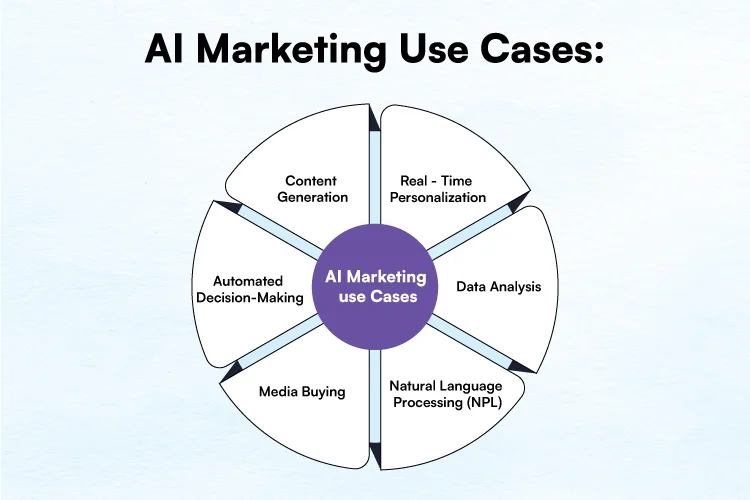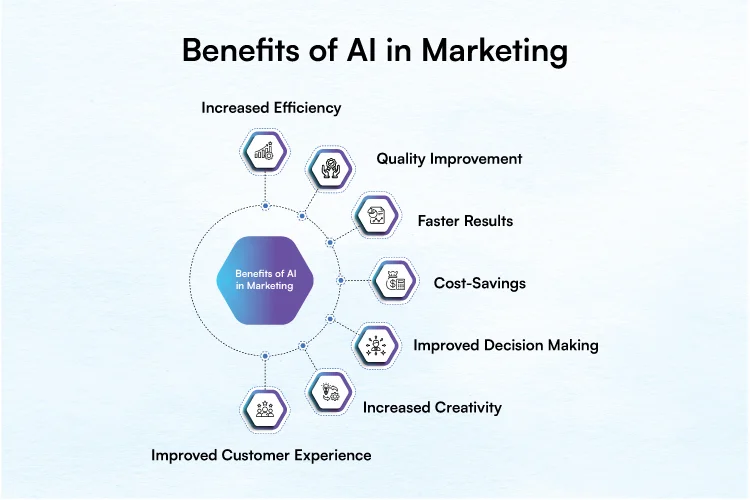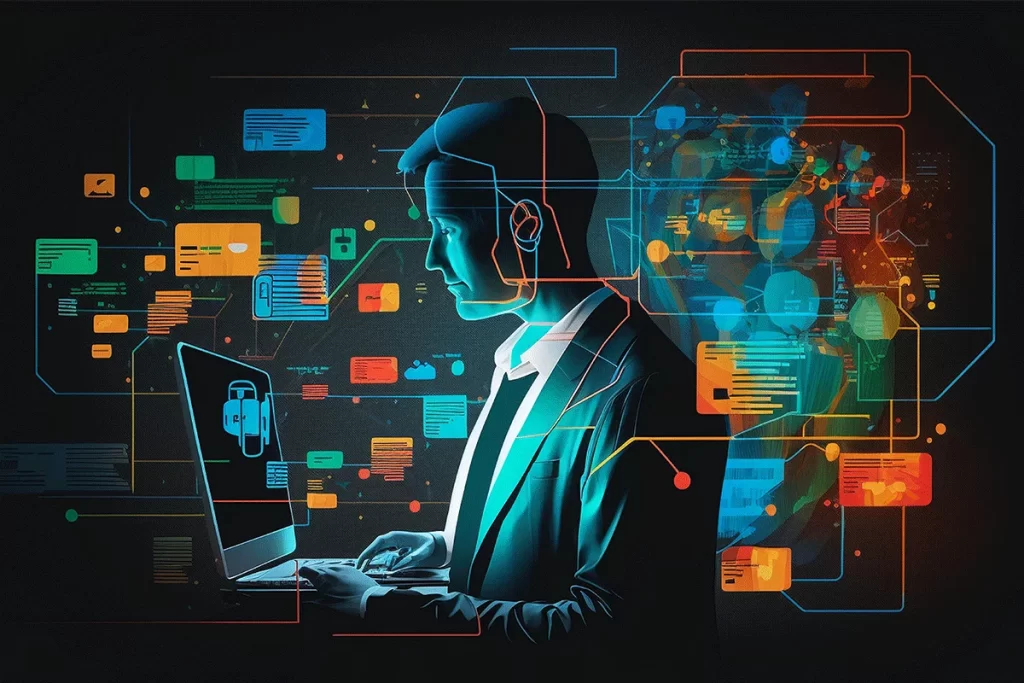With the rise of intelligent marketing technologies and the incorporation of “Generative AI” like ChatGPT has driven the importance of artificial intelligence in marketing and is expanding as the world digitizes. With the help of such advanced resources, marketing departments can do even more of what they excel at.
While using AI in marketing is still a new idea, it has already proven to be a very useful tool for marketers. In this blog, we will look at how businesses are using AI to enhance their marketing efforts and increase profit.
AI Marketing at a Glance:
It’s a strategy for enhancing the customer experience through the application of marketing technologies. Artificial intelligence (AI) in marketing is achieved through big data analytics and other procedures to learn more about your target audience. AI takes the uncertainty out of interacting with customers, whether through email marketing or giving customer care. In fact, studies have shown that advertising with AI increases the return on investment. On a larger scale, however, it can replace humans in previously manual tasks.
Most common applications of generative AI nowadays are in the fields of content creation, pay-per-click advertising, and site design.
What does the future of AI entail for marketing and sales?
The rise of Generation AI has the potential to affect three areas of marketing and sales: customer experience (CX), growth, and productivity.
In CX, hyper-personalized content and products, for example, might be based on individual consumer behavior, personas, and purchase history. Growth may be expedited by employing AI to kickstart top-line performance and providing sales teams with the necessary analytics and customer insights to capture demand.
Furthermore, AI can improve sales effectiveness and performance by offloading and automating many routine sales processes, freeing up capacity to spend more time with current and prospective customers.
Personalization is essential in all of these acts. AI, when combined with company-specific data and context, has delivered the most granular level of customer insights, allowing B2C business customization through customized marketing and sales offerings
AI Marketing use cases:

- Data Analysis: It is the process of gathering and sorting through a lot of marketing data from different campaigns and programs that would have to be done by hand otherwise.
- Natural Language Processing (NLP): It is the process of making human-like language for content creation, customer service bots, personalizing experiences, and more.
- Media Buying: It is the process of figuring out which ads and media placements will help a business reach its target group and get the best return on investment (ROI) from its marketing plan.
- Automated Decision-Making: AI marketing tools help a business decide which marketing or business growth plan to use based on data from the past or from outside sources.
- Content Generation: It is the process of writing short and long pieces of content for a marketing plan, such as video captions, email subject lines, web copy, blogs, and more.
- Real-Time Personalization: It is when a customer’s experience with a marketing asset like a website, social post, or email is changed to fit the customer’s past tastes to get them to do something like click a link, sign up for something, or buy something.
How can Marketers use Generative AI?
As marketers you already have the data that you need for creating value. Below are the three ways of using Generative AI in marketing:
Use of AI & Smart Segmentation to Identify the Target group
Segmenting your target audience is a crucial step in every marketing campaign. It’s tough to win over the consumer if you have no idea who it is you’re trying to persuade.
With the use of AI and predictive analytics, companies can now target only their most likely customers. This results in a quicker and more precise procedure. It can also be used to find other groups within this population that have similar traits. Generative AI can help businesses engage with customers on a more personal level by allowing them to customize their pitches to each buyer.
Below are some ways to use AI for more accurate customer segmentation:
- Give a brief description of who and what makes up your primary intended audience.
- Make use of AI for in-depth research and to discover previously unknown categories of people.
- Use these sub-segments as target audiences for tailored communications.
Use AI to establish Relationships with Customers on their terms
An excellent starting point is a careful segmentation of your target demographic. On the other hand, as a marketer, you need to make sure you’re sending out the proper messages and executing them via the most effective distribution channels and at the most opportune moments.
Finally, by comparing the total number of messages delivered to the clients with the number of active clients, you may get a picture of how your target audience prefers to interact with your communications.
Use AI to provide each Segment of a Target group with Content tailored to its needs
After you’ve figured out who you want to reach and how to get in front of them, you can start working on some interesting content. In the past, you might make use of material that featured unique discounts or other creative twists based on your individual characteristics. Utilizing dynamic content is the term for this strategy. The method is straightforward and only necessitates the addition of dynamic fields to the website, mobile app, or electronic brochure. After that, AI will put in the appropriate bids based on the demographics of the target audience.
Here’s how to utilize Generative AI to gauge how much tailored information to deliver:
- Develop a variety of deals aimed at various subsets of your intended customers.
- You can target specific demographics with your offers by using a combination of tags and other metadata.
- Integrate dynamic fields tied to tags and metadata into your text.
- Make use of machine learning and automatic recommendation engines powered by artificial intelligence.
Benefits of Generative AI in Marketing:
The significance of Generative AI to the enterprise, with its potential to revolutionize the sector in every respect, cannot be overstated. Such innovations will greatly increase output, open new avenues of creativity, and facilitate the solution of difficult challenges. Eventually, generative AI will radically alter the ways in which data is accessed, content is produced, customer requirements are met, and enterprises are managed.

Benefits in Detail:
-
- Increased Efficiency: Generative AI can be used to automate jobs that would normally have to be done by hand. This makes them more efficient. This can help firms save time and money while also increasing efficiency. So, it can be used to quickly and correctly make images and videos that can be used in marketing campaigns or other projects.
- Quality Improvement: AI can help make the material better. It can be used to make high-quality pictures and movies that look better than ones made by hand. It can also be used to make text that is better and more accurate than text made by people.
- Faster Results: Businesses can get results faster with generative AI than with manual work. It can make pictures and movies much faster than a human could. This can help businesses to complete their duties much more quickly.
- Cost-Savings: By automating jobs, businesses can save money by cutting down on the number of people they need to pay. It can also help businesses save money on costs related to making material, like images and videos.
- Improved Decision Making: By using Generative AI, companies can now generate data that can be used to make better decisions e.g., it can be used to generate data that can be used to make decisions about marketing campaigns or product development.
- Increased Creativity: Businesses can come up with new ideas and concepts that they can use to make new goods or services.
- Improved Customer Experience: Customers will have a better experience because businesses can make content that is more accurate and useful to them. This can help companies make things better for their customers and make them happier.
How will AI change the way that Internet Marketing works?
- AI in Customer Relationship Management (CRM): Digital marketers can utilize AI-driven applications to tailor their interactions with customers and provide a better user experience through discounts and other incentives to win back disloyal customers. Additionally, AI-driven CRM employs predictive analysis to glean profound insights about customer behavior and preferences from a wide range of data.
- Generative AI in SEO: Marketers can benefit from AI-powered SEO by enhancing keyword research, content creation, link building, and website analysis. Generative AI for SEO examines massive amounts of data to find relevant keywords. And implement them to better your site’s position in the SERP (Search Engine Results Page).
- AI in Social Media Marketing (SMM): Social media posts, hashtags, and visuals are all examples of the kind of content that can be generated by Generative AI-enabled tools used by marketers. The effectiveness of an SMM strategy may be tracked and monitored with the help of these AI-driven solutions. Social media platforms can also use Generative AI to tailor their content to each individual user depending on their demographics, location, and other characteristics.
- AI in Content Marketing: As consumers become more accustomed to and interested in content-based advertisements, content marketing has emerged as a powerful form of advertising. Generative AI aids content marketers in determining what their current and potential clientele are interested in reading. It allows you to write and edit text. ChatGPT and BARD, both cutting-edge AI applications, have recently gained widespread notice for their capacity to provide conversational replies to virtually any topic.
Best practices of using Generative AI in Marketing:
- Use High-Quality Data: AI that works well depends on good data. This means making sure that the data used to teach the AI is not only a lot, but also correct, useful, and not biased. It is up to the marketer to get, handle, and keep this information up to date.
- Continually Review and Refine: AI is not a tool that you can set and forget. Marketers should always look over and improve the results of AI. This means checking the material for correctness, appropriateness, and relevance, and making changes as required.
- Update AI Models regularly: Consumer behavior and market trends change all the time, so the marketing environment is always changing. So, AI models should be changed often to keep up with these changes and keep the AI working well.
- Consider the Ethical Implications: Marketers should always think about the ethical aspects of using AI, like keeping data private and being open about how it is used. This means being clear with customers about how their data is being used and making sure that all marketing practices that are based on AI follow all laws and rules.
- Collaborate: The goal should be to make it easier for AI and human salespeople to work together. This means being aware of the strengths and weaknesses of both and using them in a way that gets the most out of them. AI can handle data analysis and (some) content creation, while humans can provide creative thought, emotional intelligence, and ethical oversight.
Top Brands using Generative AI for Marketing:
Amazon
Amazon uses AI to drive dynamic pricing, lowering prices to increase sales when necessary and raising prices when demand is great. The system automatically optimizes sales and revenue. Amazon has constructed checkout-free physical stores in Seattle, Chicago, and San Francisco, using AI-powered sensors and cameras, showcasing its continuous technological leadership. This technology can detect which things a consumer has selected and will immediately charge them as they exit the store via the Amazon Go app.
Starbucks
Starbucks has improved its incentive program and customization with the use of AI and big data, and the company has delivered. The brand has benefited by interacting with a wide target audience in order to offer them targeted marketing materials, such as in-store recommendations and specials meant to increase customer spending. Customers can, however, utilize the company’s AI-powered app for virtual barista service to place orders by voice command.
Nike
Nike has always been on the cutting edge of technology. Recently, Nike put out a new program that lets people design their own shoes right in the shop. This is a great way to boost sales, and it also collects a lot of useful information that machine learning algorithms can use to design new products and send personalized suggestions and marketing messages. Thus, all thanks to AI for boosting up the sales.
The company recently bought the body scanning company Invertex. AI has driven Nike’s capabilities and with the help of this the brand creates the most compelling consumer experience every time.
BMW
Several businesses are already employing AI to power self-driving cars, but BMW is genuinely embracing the technology and incorporating it into its manufacturing processes and broader marketing strategy.
Big Data is used by BMW to power its design and engineering operations, as well as sales and customer service. The company has previously produced an AI-enhanced racing car that educates its driver to automatically change systems and the cabin experience to suit everyone.
Future of AI in Marketing:
As we’ve seen, Generative AI is becoming an important part of CRM, SMM, SEO, and content marketing, as well as improving the future of marketing. Now you know a few things about how AI will be used in marketing in the future. There’s no doubt that this technology has a bright future, but we won’t really know how it will change the world until it becomes more popular.
Generative AI is being used right now to improve almost every aspect of business. It helps with marketing in a lot of ways, like getting to know people better and figuring out how well a campaign has performed.
The marketing industry as a whole stands to benefit greatly from Generative AI, as it will allow companies to provide clients with more tailored and exciting interactions. More novel and consequential applications of technology are likely to appear in the years ahead as it develops further.
Businesses can also benefit from using AI to create better, more specific marketing. Make AI the backbone of your agency’s marketing approach to boost sales and cut costs.
Hence, Generative AI has the potential to improve long-term viability, scalability, and worldwide tendencies. It will affect urban areas, public policy, and political dynamics. It has the potential to make things better all-around if applied properly.
If you’re looking for a private and personalized encounter with Generative AI, Cuneiform Consulting Pvt. Ltd. is here to help. Newer tools and industry standards in a variety of fields are at your disposal. We provide our clients with generative AI so that their business processes may be easily transformed, managed, and improved with top-notch AI software. Cuneiform’s AI-driven solutions aim for exceptional growth in the digitizing market, which means bigger prospects and higher results for the company.




